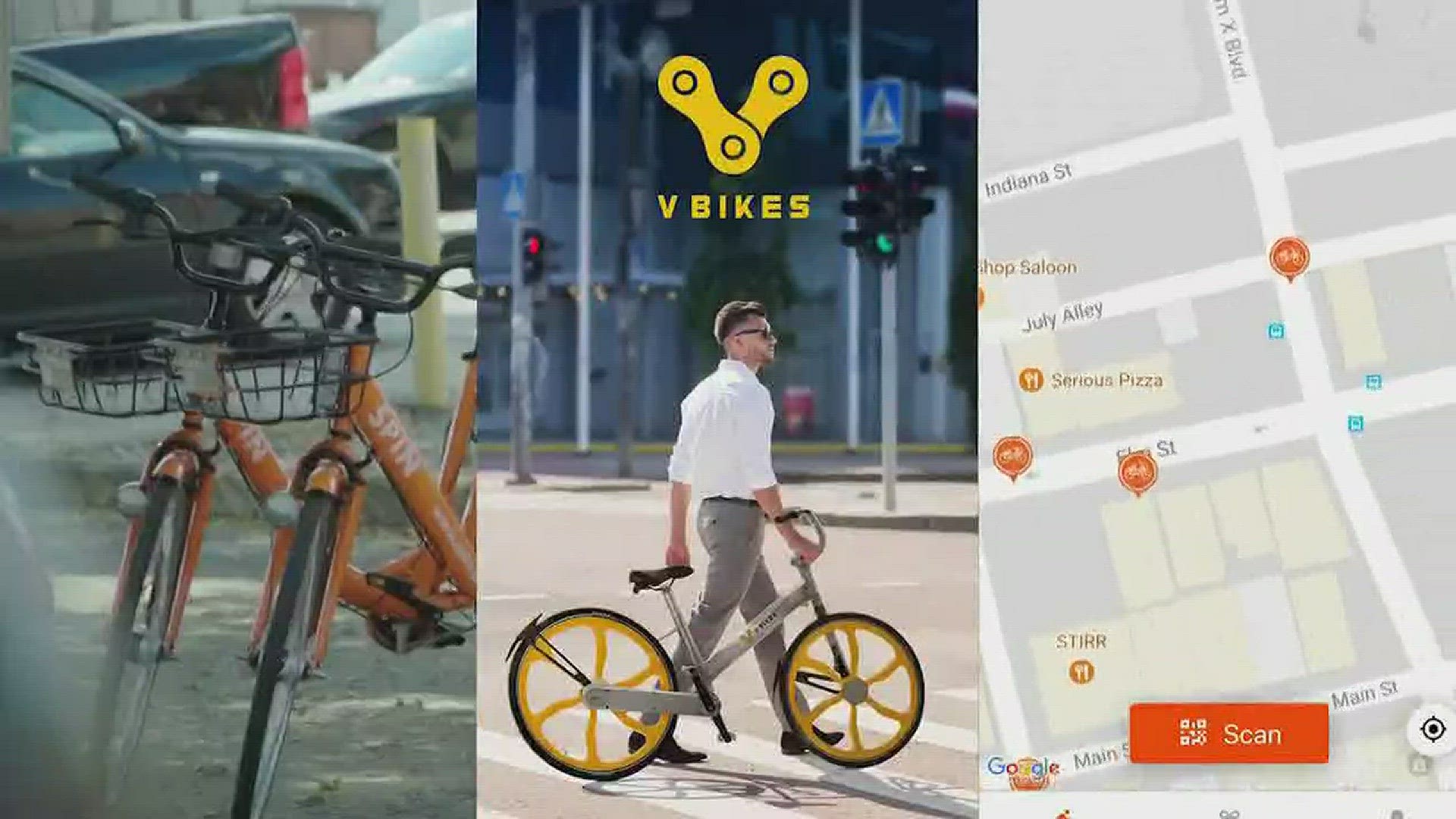Bike sharing used to be it was an orderly affair. Most cities do it like Fort Worth does. Rent at one station, return to another station. Now, a growing number of cities in America are being invaded by colorful, station-less bikes.
FINDING A BIKE
I have a whole bunch of questions I wanted answered. Maybe, you too.
How does this all work? How do you get the bike? Where do you put the bike back? How much does it cost? Is it comfortable? Does the seat go up and down?
Stuff, like that.
To kick this story off, I want to see how easy it is to find a bike near my office. Then I’ll ride that bike about a mile-and-half from here and grab some lunch.
In Dallas, there are three companies operating; all of them are run through apps. Spin is orange, Vbikes is silver and LimeBike is green.
All the bikes have onboard GPS units. So you can find the bikes by looking at the company’s app. But, I found, some bikes show up on a map even though they are not parked on the sidewalk.
These things are designed, so they're hard to steal. There's a lock on the back tire. You use your phone to open it up. Rides cost $1 an hour.
There are several Vbikes near my office, so that’s what I’m riding first. The bike is solidly built, but I have long legs and didn’t like that you can't adjust the seat. Also, it only has one gear, which is rough while going up hills.
Slightly exhausted, I made it to lunch.
VBIKES HEADQUARTERS
Station-less bike sharing is an idea that comes from China. It's so popular, sometimes sidewalks look like bicycle dumping grounds. Vbikes is a private company based in Garland, Texas. They brought the idea here from China. China is also where their bikes are made.
Lummy Rushiti, Director of Government Affairs, says the company has agreements with 30 properties in Dallas, mostly apartments. Each bike originates from one of these properties, and the company says it will continually bring bikes back to the property.
On Facebook, I recently asked you to share some of your questions about bike sharing and I brought them with me to Vbikes.
Micah Moore asks: “What is being done to keep these bikes from littering sidewalks and pathways? I see them strewn almost every block of East Dallas?”
“This is not our product, it's LimeBike and Spin,” Rushiti said.
Actually, I saw bikes of all colors, blocking sidewalks. Vbikes says it will come fetch abandoned bikes after five days, unless they get a complaint before that.
“With all of your bikes and the lime bikes and the spin bikes, do you think there are too many bikes?” I asked.
“Actually, we need more,” Rushiti said.
Vbikes says it's introduced 2,000 bikes to the DFW area. They want 10,000.
LIMEBIKE AND SPIN
Now, we're checking out Spin and Lime Bike. Both startups are based in San Francisco. Spin has raised $8 million in funding, LimeBike $12 million.
The first two Spin Bikes I tried would not unlock. But the third was a charm, and I hit the road, heading back to work.
Spin and Lime both have an adjustable seat and three gears. Lime was my favorite.
“This bike is just very solid,” I said about the LimeBike.
REGULATION
Now, I'm talking to Dr. Shima Hamidi. She runs the Center for Transportation Equity at the University of Texas- Arlington. While bikes from docking stations are typically for recreation, she says station-less bikes could be more functional, part of a larger transportation system.
“They can be a game changer for public transit accessibility if they are planned in the right way,” she said.
“Well, it doesn't seem like they are being planned at all. Not in Dallas,” I said.
“Not in Dallas. And that could be a potential issue,” she said.
In fact, when the bikes showed up, Dallas had no rules about what the companies should be responsible for. And it still doesn't.
Dr. Hamidi says cities need to tell companies what kind of behavior they expect and how many bikes should be on the streets.
“The cities should hold the bike companies accountable to take care of that?” I ask.
“Depends on the agreement, but yes, that is the responsibility of the bike companies,” she said.
CONCLUSION
So, what did we learn about station-less bike sharing?
· Bikes are affordable, fairly easy to find and to use
· There's the potential for bikes to clog up city sidewalks
· There are currently no city rules about how bike sharing companies should operate
Got something you want verified? Send me an email david@verifytv.com

